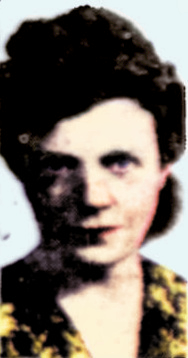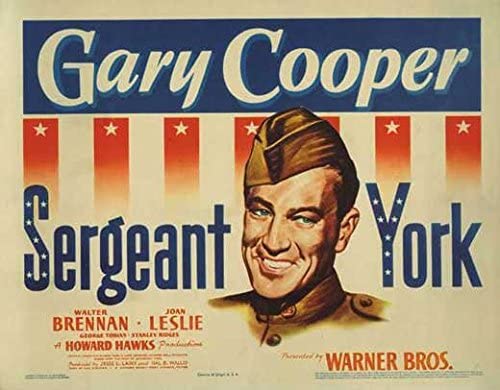The Pittsburgh Press (August 1, 1941)

I DARE SAY —
…
Sergeant York
…
By Florence Fisher Parry

New York City –
It must have been about 14 years ago. I’d never written a professional line, and if anyone had said I was going to write a daily newspaper column, I’d have laughed at the idea. A moving picture was to open that night – I’d been hearing about it and made effort to go. It was The Big Parade. I wrote about it and sent it in to the Pittsburgh Sun. It was published, and from that time on, I was a columnist.
I often wonder whether or not I’d ever have written a newspaper line if it hadn’t been for The Big Parade. There was something about that picture that set something free in me, made me have to set down in writing what I felt. It never had happened to me before; it never has happened since.
Not until yesterday. Yesterday, the same overwhelming impulse came over me again. I saw another picture, this time Sergeant York. I made a blue streak for my typewriter. It seemed I couldn’t wait to get how I felt SET DOWN. We… I couldn’t write it then, something tore me away. That’s why this won’t be another Big Parade column. 24 hours is too long a time to let an emotion cool.
Only this is my advice to young would-be writers. Go see Sergeant York and then write down how you feel about it. Right away. Right away. If you can’t do a swell job, you might as well give up all idea of being a writer.
That’s the kind of a picture it is. Just – grand. Just – wonderful. The best, I believe, that has happened since The Big Parade. I mean, it’s just as good for NOW as The Big Parade was for THEN. There’ve been staggering improvements all along the line and the old picture would seem pretty bad today, I dare say. And to compare Jack Gilbert with Gary Cooper would be something of a sacrifice – that’s how good Gary is in this picture.
But the two pictures have this in common: they carry you away. They are realer than you are. They lift you right out of your skin. You forget where you are. You lose all sense of illusion. You are no longer you, sitting in a theater seat looking at a screen with moving shadows upon it; you are THERE in Tennessee; you are THERE on no man’s land; you are THERE, inside the hide of Sergeant York, performing his incredible heroism.
THIS, my friends, is what is meant by a great picture.
The true test
Not once, as you watch it, do you find yourself thinking: What good photography! What clever direction! What realistic dialog! What superb continuity! What grand acting! The objective approach is gone, swallowed up in your own living participation with what’s GOING ON.
Once in a while, a motion picture achieves this pinnacle of art. Not often. The Birth of a Nation achieved it, in its day. The Big Parade achieved it. Stagecoach came near achieving it. Not many others, though. Compared with these, other supposed masterpieces have been contrived and artsy. They have made you conscious of them; and I say that when you are made CONSCIOUS of a picture’s art, it has failed of perfection. It has not sprung free of its medium.
Oh, there are many pictures which will claim greater artistry than Sergeant York. Citizen Kane is one of these. It fairly bristles with “genius.” But you keep being reminded of its “genius.” It comes between you and the picture. Not so Sergeant York. Sergeant York and what’s happening to him – inside, outside; he fills the whole area of your consciousness. Not once do you remember to “notice” the direction or score or acting or photography or anything. Sergeant York possesses you utterly.
Later, after you’ve left the theater and your own life and consciousness return to you, and you begin thinking and talking about it, you remember this and that about the picture; yes, there needn’t have been so much “love” interest; yes, they could have cut out some of the slower-moving scenes; yes, the last sequences were an anti-climax; yes, it could have been improved here and there.
But while you were seeing it, it lived! That’s the important thing. When a picture and its people take on such life that nothing interrupts the illusion that they’re real, then that picture has achieved greatness beyond art. And Sergeant York does this. To me, it is the best motion picture I have seen since The Big Parade.
This is our dish
Gary Cooper is Alvin York. Without him to play the role, it just simply couldn’t have been done. His “York” transcends all acting. It is of the essence of himself. I have seen many great “performances,” but they have remained “performances.” That was the trouble with them. But Gary’s “York” isn’t a performance at all. It takes full possession, and becomes, in consequence, the most moving, believable and complete characterization yet achieved by any motion picture actor.
Sergeant York isn’t a war picture at all. The only time the war enters in is toward the last; and then, unspoiled by any preliminary war-sequence build-up, the actual capture of the 132 prisoners, single-handed, takes place – suddenly – as much of a surprise to us as to Sergeant York himself; a stunning effect, far more effective than could have been achieved by any other device!
